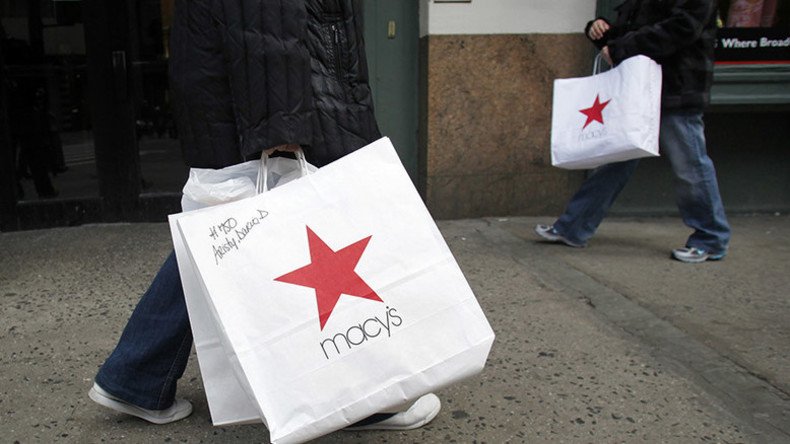‘Operates like jail’: Macy’s accused of detaining minority customers as would-be shoplifters

Macy’s in New York City is being accused of detaining minority customers and “operating as a typical jail.” According to a class-action lawsuit, the department store’s security targets blacks and Hispanics, citing “shopkeeper’s privilege.”
The most recent lawsuit against Macy’s on Herald Square came to light due to a report by DNAinfo, a digital news outlet, which covered a story on Cinthia Carolina Reyes Orellana.
The 29-year old woman, a plaintiff in the case, said she was grabbed by a security guard and accused of planning to shoplift after she had taken a couple of shirts that she was going to buy from one floor to another. Her purse was then seized and she was escorted her to a "holding cell” in the store’s basement.
Macy’s security staff questioned Orellana for over three hours without giving her access to her cell phone and or allowing her to call a lawyer or family, according to the lawsuit.
She was then ordered to sign legal documents admitting her guilt and forced to pay a $100 cash fine. After all that, Macy’s security handed the woman over to the NYPD and her ordeal continued.
Orellana was taken to the Midtown South Precinct, where she was questioned and charged with “petty larceny and criminal possession of stolen property,” according to DNA info. The charges were dropped the next year.
Several months after the incident, the store began issuing even more fines through the mail. In September 2014, Orellana received a series of mails on behalf of Macy’s. Palmer, Reifler and Associates PA, a law firm, ordered her to pay an additional fine of almost $200 to settle a civil claim related to the arrest, according to the suit.
Now Cinthia Orellana is looking for justice. In November of this year she filed a lawsuit against Macy’s.
“This coercive collection practice or scheme has become so profitable that Macy’s … has dedicated an entire unit within its existing store, which operates like a typical jail, equipped with holding cells, where alleged shoplifters are held for hours on end, and are pressured, threatened, and often harassed until they find no reprieve but to make civil penalty payments to [Macy’s],” reads the lawsuit filed in Bronx Supreme Court.
As lawyers explain, businesses like Macy’s can act like this without impunity under the so-called “shopkeeper’s privilege” rule in New York’s General Business Law. It allegedly allows retailers to detain customers who they suspect might steal, and then interrogate them and make them pay a fine without proving their guilt.
According to the class-action suit, thousands of blacks and Hispanics have been targeted by the same practice.
“What the lawsuit aims to do, is to finally put an end to this practice, and bring justice to past victims, whom we encourage to come forward and join Cinthia,” Faruk Usar, Orellana’s lawyer, wrote in an email to DNAinfo.
When asked for a comment, Macy’s told the news portal that it would not comment on the ongoing case. The store also failed to comment on whether there is a special policy for shoppers that prohibits carrying items between floors.
At the same time, speaking with Time magazine online, Macy’s denied the claims made in the suit, saying that the company is “in full compliance with the law.”
“Our company takes great pride on the proactive steps we have taken in recent years as an industry leader in shopping equality,” Jim Sluzewski, a spokesperson for Macy’s, said in an email.
Cinthia Orellana’s case is just the most recent to accuse Macy’s of racist actions.
In 2013 the company was dragged to a court by actor Robert Brown who starred as a musician in HBO’s “Treme.” Brown sued both Macy’s and the NYPD for wrongfully accusing him of using a stolen credit card after undercover detectives interfered when he was shopping for a $1,350 Movado watch.














